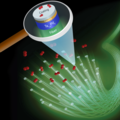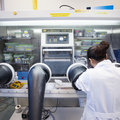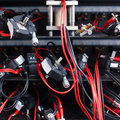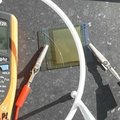News
02 March 2021
Delft researchers develop a versatile hydrogen sensor

Hydrogen is playing an increasingly important role in the transition to a completely sustainable economy. Right now it is already being used on a large scale in industry, but it is also being used more often for sustainable energy storage and as a fuel for large and heavy vehicles in particular. There are plans for converting the existing natural gas network into a hydrogen network. However, under certain circumstances hydrogen is a combustible and sometimes even an explosive gas, so it is important to track down the tiniest hydrogen leaks as quickly as possible. This makes cheap, reliable and small sensors that can quickly detect small amounts of hydrogen of vital importance. Researchers at TU Delft have now developed a material that is extremely suited to this task.
11 February 2021
Reactor Institute Delft re-appointed as official partner of International Atomic Energy Agency

The Reactor Institute Delft (RID), the nuclear research reactor at TU Delft, has been selected as a Collaborating Centre of the International Atomic Energy Agency (IAEA) for the fourth time. The IAEA and RID have agreed to expand their area of cooperation in Neutron Activation Analysis (NAA) to neutron beam-based methodologies – a key technique in materials research, biology and medicine.
06 January 2021
PhD cum laude for Evert Merkx

We are one step closer to Luminous Glass. On December 14th 2020, Evert Merkx from the department of Radiation Science & Technology (RST) successfully defended his PhD thesis and the accompanying propositions. After a rigorous examination, the committee decided to award Evert the PhD cum laude. ‘Cum laude’ is the highest honor TU Delft can bestow upon PhDs, awarded only to the top 5% of PhD students.
09 November 2020
TU Delft formula brings green new battery closer to reality

Researchers from the Chinese Academy of Sciences and Delft University of Technology (TU Delft) have developed a method to predict the atomic structure of sodium-ion batteries. Until now, this was impossible even with the best supercomputers. The findings can significantly speed up research into sodium-ion batteries. As a result, this type of battery can become a serious alternative to the popular Li-ion batteries found in our smartphones, laptops and electric cars. The researchers have published their findings in the prestigious scientific journal Science.
27 August 2020
Researchers take important step towards new generation of batteries

Delft University of Technology researchers, in collaboration with researchers from Tsinghua University, have taken an important step towards a new type of Li-ion battery, which can be found in our smartphones, laptops and electric cars, among other things. For the first time, they succeeded in making an electrolyte that goes well with an anode made of lithium metal. Lithium metal is the holy grail for anodes. In theory, a two to three times higher energy density can be achieved with this material compared to current batteries.
18 June 2020
Impulse health & technology research with nine new Medical Delta professors
Nine professors are now allowed to call themselves ‘Medical Delta professors’. They received a dual appointment at two or more academic institutions (LUMC, Leiden University, TU Delft, Erasmus MC, Erasmus University) that are affiliated with Medical Delta. This will boost health & technology research once again.
10 March 2020
Researchers organically engineer solar cells using enzymes in papaya fruit

Titanium dioxide (titania) thin films are commonly used in various types of solar cells. The fabrication methods that are currently used to create such titania films require high temperatures, as well as expensive, high-end technologies. Researchers at Delft University of Technology (TU Delft) have now developed a fully organic method to engineer porous titania thin films at relatively low temperatures.